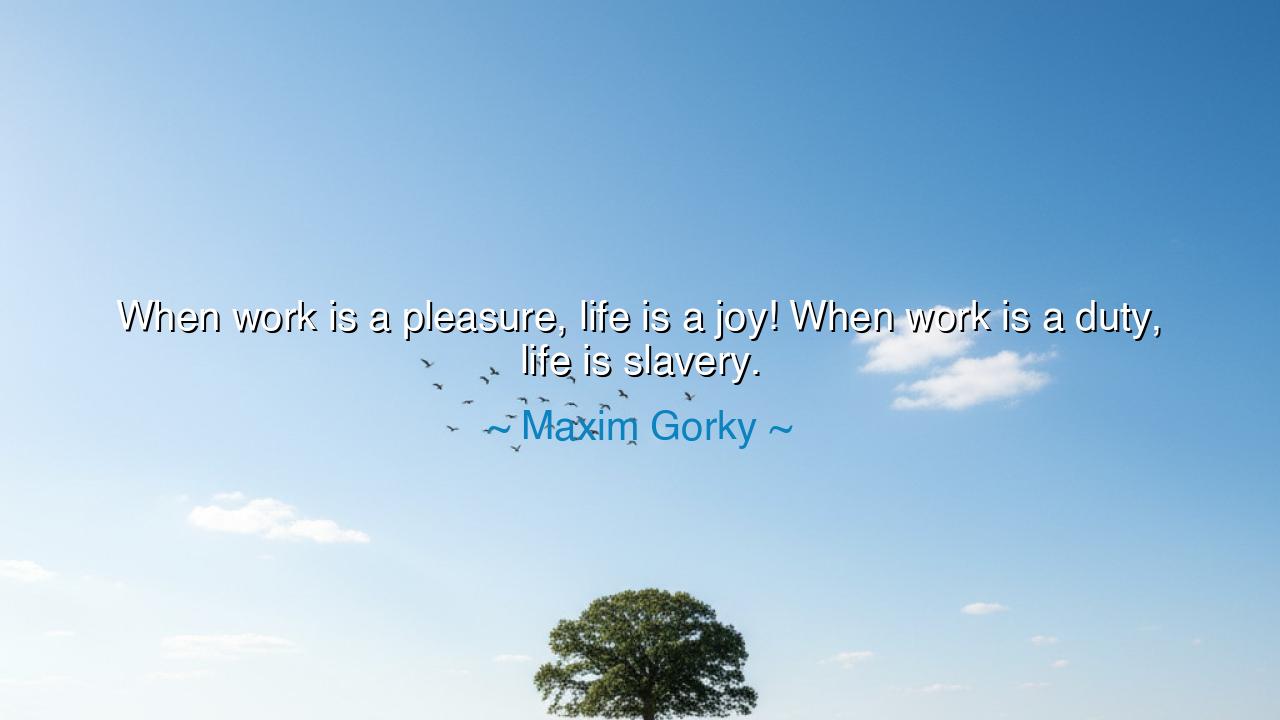
When work is a pleasure, life is a joy! When work is a duty






When Maxim Gorky declares, “When work is a pleasure, life is a joy! When work is a duty, life is slavery,” he speaks with the fiery voice of one who knew both the chains of hardship and the liberating force of passion. His words reveal the eternal truth that labor, when joined with love and purpose, lifts the soul, but when imposed as burden alone, crushes it into despair. The difference lies not in the task itself, but in the spirit with which it is embraced.
The origin of this wisdom springs from Gorky’s own life, born in poverty, toiling in menial jobs, yet rising to become one of Russia’s most celebrated writers and thinkers. He witnessed firsthand the misery of those whose work was imposed by necessity and stripped of meaning, and he contrasted it with the creative joy he himself found in literature and art. His cry reflects the struggle of the laboring masses, yet also the deep insight of one who discovered fulfillment in devotion to a higher calling.
To call work a pleasure is to see it as an extension of the soul, a place where creativity, skill, and purpose converge. Here, life blossoms into joy, for the laborer does not feel enslaved but fulfilled, his efforts aligned with his heart. Yet to call work a mere duty is to speak of drudgery, of toil performed without love, imposed by circumstance or coercion. In such a state, life itself becomes diminished, felt as bondage rather than blessing.
His words also serve as both warning and counsel to societies. When a people are forced into lifeless toil, the spirit of humanity suffers, and resentment grows. But when systems of labor nurture dignity and creativity, the people thrive, and their work enriches both themselves and the world. Thus, Gorky teaches that how we shape our labor shapes the very destiny of our lives.
Let the generations remember: to find pleasure in one’s work is to unlock the secret of joy. To live only by imposed duty is to surrender to slavery of the soul. Maxim Gorky’s words endure as a timeless reminder that the worth of life is measured not merely by what we do, but by whether our doing springs from love, purpose, and freedom.






NGLam Ngoc Giau
Gorky’s quote brings up an important point about the connection between our work and overall satisfaction. When work feels like a joy, it’s motivating and energizing. But when it feels like a duty, it can weigh heavily on our lives. How can we make sure that we are pursuing work that feels rewarding, or even, how do we find purpose in jobs that may not naturally bring us joy?
VNbi van nguyen
I agree with Gorky—when work feels like a passion, life can be incredibly fulfilling. But when it’s just something you do to get by, it feels draining. Do you think society places too much pressure on people to be productive or passionate about their work? How can we break free from the cycle of seeing work as a duty and instead make it something that brings us joy?
RRuoZhi
Gorky's words hit home for many of us, especially when work feels like a never-ending cycle of responsibilities. Have you ever thought about how the way we view work impacts our general happiness? It’s easy to get caught up in the ‘have to do this’ mindset, but do you think it’s possible to turn that around and find joy in the mundane tasks of life?
TTThu Thao
This quote really makes me question how much of our lives we spend in jobs we don’t love. The idea that work should feel like pleasure is powerful but rare. What if you’re stuck in a job that feels like duty, how do you shift your mindset to make it more fulfilling? Can that really change how we experience our whole life?
TNTin Nguyen
Maxim Gorky's quote makes me reflect on how our attitude towards work can shape our entire experience of life. When you’re doing something you enjoy, it doesn’t feel like work at all, does it? But when it feels like a chore or something you’re just ‘getting through,’ that’s when life starts feeling burdensome. Do you think it’s possible to find joy in any kind of work, or is it something that has to come naturally?